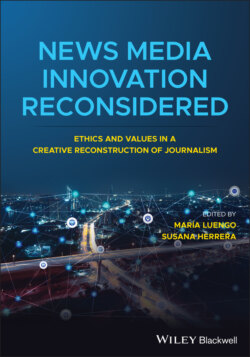Читать книгу News Media Innovation Reconsidered - Группа авторов - Страница 34
Ultimate Goal: Dialogic Democracy
ОглавлениеJournalists can be engaged in ways that are positive or negative, responsible or irresponsible. So, we face a choice in forms of engagement.
For democratically engaged journalism, the goal is the promotion of democracy. But there are many forms of democracy—representational, republican, parliamentary, elitist, populist, participatory.20 Democratically engaged journalism does not support all these forms. For instance, it should not support a populist democracy where demagogues use media to portray themselves as “strong” men of the people; and it should not support an elitist form of democracy marked by great inequalities.
In my view, democratically engaged journalism should support a representational, liberal democracy that is plural and egalitarian. It is open and participatory in impulse and structure, with constitutional protection for minorities from the tyranny of majorities. As Dewey argued, this form of democracy is a precondition for the richest kind of communal life and human flourishing.21
Plural, egalitarian democracy is grounded in the rule of law, division of powers, public-directed and transparent government, and core liberties for all. The process of plural democracy is robust, knowledge-based, respectful dialog, a willingness to compromise for the common good, and a readiness to test (and modify) one’s partial view of the world.22 I call this dialogic democracy. It is important that people have a meaningful opportunity to participate in crucial decisions. Yet, how they participate is also crucial. Dialogic democracy requires moderate, informed exchanges of information and views not dominated by powerful interests or intolerant voices. Dialog promotes what Rawls called a “reasonable pluralism,” a reasonable discourse among groups with different values and philosophies of life.23 Dialogic democracy is an ideal. It is valuable as a target at which to aim.
How does journalism help democratic publics exist? By influencing the flow and quality of communication in a democracy’s public sphere. Journalism can help societies make the often-difficult assent to better forms of democracy, characterized by tolerance and equality. Or, journalism can encourage intolerant communication which sends democracy into a downward spiral to discordant society.
Promoting dialogic democracy requires much more than disengaged, neutral reporting. It requires journalistic engagement in democracy. Among the tasks of democratically engaged journalism is monitoring and alerting the public to leaders or groups that could undermine a democratic “concord” among groups.
To face our troubled public sphere, journalists could “double down” on neutrally reporting just the facts, such as quoting accurately what leaders like Donald Trump say in public; or sticking unswervingly to balanced reports on crucial issues, such as immigration or climate change, where voices for non-credible and intolerant views are given equal space with credible and tolerant views. Or, journalists could become engaged as partisan activists, identifying with, and becoming mouthpieces for, specific political parties or leaders. Perhaps they might join protesters marching in the streets.
